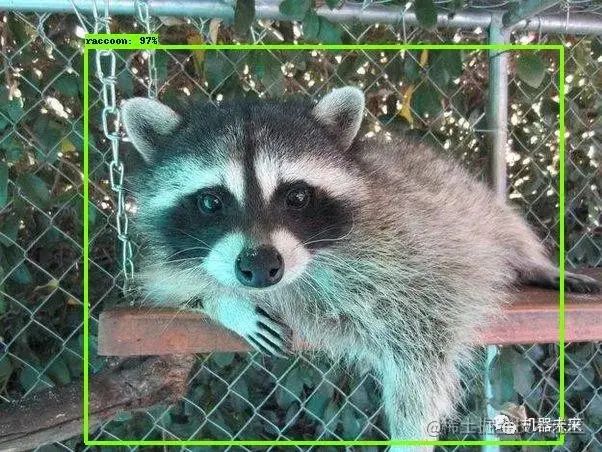基于Tensorflow2.x Object Detection API构建自定义物体检测器
. 概述
tensorflow object detection api一个框架,它可以很容易地构建、训练和部署对象检测模型,并且是一个提供了众多基于COCO数据集、Kitti数据集、Open Images数据集、AVA v2.1数据集和iNaturalist物种检测数据集上提供预先训练的对象检测模型集合。
tensorflow object detection api是目前最主流的目标检测框架之一,主流的目标检测模型如图所示:
snipaste20220513_094828
本文描述了基于Tensorflow2.x Object Detection API构建自定义物体检测器的保姆级教程,详细地描述了代码框架结构、数据集的标准方法,标注文件的数据处理、模型流水线的配置、模型的训练、评估、推理全流程。
最终的测试效果如下:标注物体的位置、物体的类型及置信度。
raccoon-28
2. 组织工程文档结构
- • 创建父目录 创建tensorflow文件夹,将下载的object detection api源码models目录拷贝到tensorflow目录下,结构如下:
TensorFlow/
└─ models/
├─ community/
├─ official/
├─ orbit/
├─ research/
└─ ...
复制代码- • 创建工作区
cd tensorflow;
mkdir training_demo ;cd training_demo;
复制代码创建完毕后的文档组织结构如下:
TensorFlow/
├─ models/
│ ├─ community/
│ ├─ official/
│ ├─ orbit/
│ ├─ research/
│ └─ ...
└─ workspace/
└─ training_demo/
复制代码- • 项目目录
mkdir annotations exported-models images/ images/test/ images/train/ models/ pre_trained_models/;
touch README.md
复制代码创建完毕后的项目结构如下
training_demo/
├─ annotations/ # annotations存标签映射文件和转换后的TFRecord文件
├─ exported_models/ # 存放训练完毕后导出的模型文件
├─ images/ # 存放原始图像数据文件
│ ├─ test/ # 存放评估图像数据集和标注文件集
│ └─ train/ # 存放训练图像数据集和标注文件集
├─ models/ # 存放训练中的pipline.config、模型数据、tensorboard事件数据
├─ pre_trained_models/ # 存放下载的预训练模型
└─ README.md # 工程说明文档
复制代码3. 标注数据集
-
• 标注工具labelImg
-
• 项目地址:传送门
-
• 下载地址:windows版本
-
• 标注示例
-
•
0318-2
-
• 标注后的xml文件统一存放到training_demo/images目录下
-
• 划分训练、评估数据集 首先创建一个公共目录
tensorflow/scripts/preprocessing用于存放脚本,便于将来复用
mkdir tensorflow/scripts
mkdir tensorflow/scripts/preprocessing
复制代码创建完成后的目录结构如下:
tensorflow/
├─ models/
│ ├─ community/
│ ├─ official/
│ ├─ orbit/
│ ├─ research/
│ └─ ...
├─ scripts/
│ └─ preprocessing/
└─ workspace/
└─ training_demo/
复制代码在tensorflow/scripts/preprocessing目录下添加训练集划分脚本partition_dataset.py,脚本内容如下:
""" usage: partition_dataset.py [-h] [-i IMAGEDIR] [-o OUTPUTDIR] [-r RATIO] [-x]
Partition dataset of images into training and testing sets
optional arguments:
-h, --help show this help message and exit
-i IMAGEDIR, --imageDir IMAGEDIR
Path to the folder where the image dataset is stored. If not specified, the CWD will be used.
-o OUTPUTDIR, --outputDir OUTPUTDIR
Path to the output folder where the train and test dirs should be created. Defaults to the same directory as IMAGEDIR.
-r RATIO, --ratio RATIO
The ratio of the number of test images over the total number of images. The default is 0.1.
-x, --xml Set this flag if you want the xml annotation files to be processed and copied over.
"""
import os
import re
from shutil import copyfile
import argparse
import math
import random
def iterate_dir(source, dest, ratio, copy_xml):
source = source.replace('\\', '/')
dest = dest.replace('\\', '/')
train_dir = os.path.join(dest, 'train')
test_dir = os.path.join(dest, 'test')
if not os.path.exists(train_dir):
os.makedirs(train_dir)
if not os.path.exists(test_dir):
os.makedirs(test_dir)
images = [f for f in os.listdir(source)
if re.search(r'([a-zA-Z0-9\s_\\.\-\(\):])+(?i)(.jpg|.jpeg|.png)$', f)]
num_images = len(images)
num_test_images = math.ceil(ratio*num_images)
for i in range(num_test_images):
idx = random.randint(0, len(images)-1)
filename = images[idx]
copyfile(os.path.join(source, filename),
os.path.join(test_dir, filename))
if copy_xml:
xml_filename = os.path.splitext(filename)[0]+'.xml'
copyfile(os.path.join(source, xml_filename),
os.path.join(test_dir,xml_filename))
images.remove(images[idx])
for filename in images:
copyfile(os.path.join(source, filename),
os.path.join(train_dir, filename))
if copy_xml:
xml_filename = os.path.splitext(filename)[0]+'.xml'
copyfile(os.path.join(source, xml_filename),
os.path.join(train_dir, xml_filename))
def main():
# Initiate argument parser
parser = argparse.ArgumentParser(description="Partition dataset of images into training and testing sets",
formatter_class=argparse.RawTextHelpFormatter)
parser.add_argument(
'-i', '--imageDir',
help='Path to the folder where the image dataset is stored. If not specified, the CWD will be used.',
type=str,
default=os.getcwd()
)
parser.add_argument(
'-o', '--outputDir',
help='Path to the output folder where the train and test dirs should be created. '
'Defaults to the same directory as IMAGEDIR.',
type=str,
default=None
)
parser.add_argument(
'-r', '--ratio',
help='The ratio of the number of test images over the total number of images. The default is 0.1.',
default=0.1,
type=float)
parser.add_argument(
'-x', '--xml',
help='Set this flag if you want the xml annotation files to be processed and copied over.',
action='store_true'
)
args = parser.parse_args()
if args.outputDir is None:
args.outputDir = args.imageDir
# Now we are ready to start the iteration
iterate_dir(args.imageDir, args.outputDir, args.ratio, args.xml)
if __name__ == '__main__':
main()
复制代码执行脚本:
python partition_dataset.py -x -i [PATH_TO_IMAGES_FOLDER] -r [test_dataset ratio]
复制代码示例:
python partition_dataset.py -x -i ../../training_demo/images/ -r 0.1
# -x 表明输入文件格式是xml文件
# -i 指定图像文件所在目录
# -r 指定训练集、评估集切分比例,0.1代表评估集占比10%

